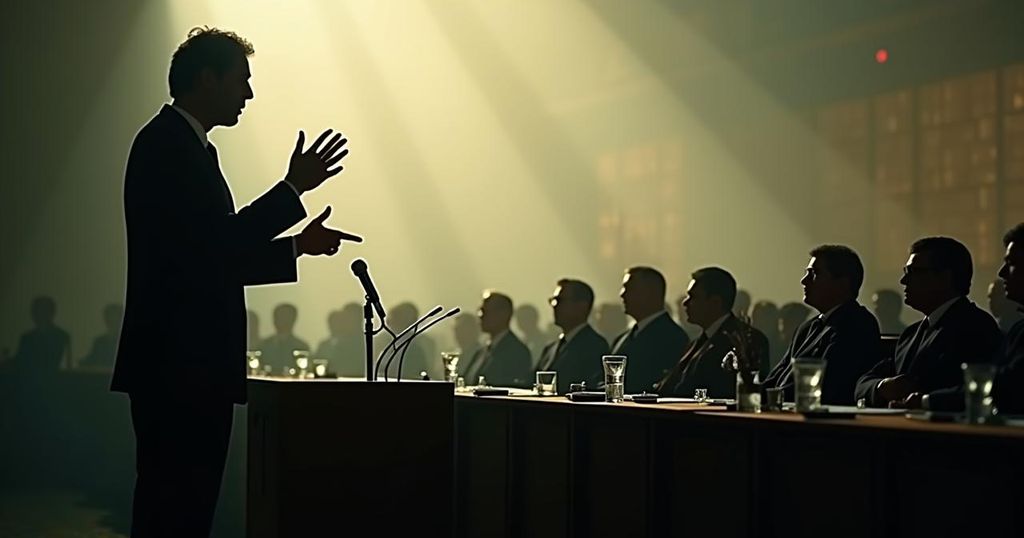S. Jaishankar’s UNGA address outlined India’s firm stance against Pakistan’s double standards, particularly relating to terrorism and the Indus Water Treaty. He indicated that India’s reactions would transcend military responses and emphasized the importance of ceasing cross-border terrorism as a prerequisite for dialogue. Jaishankar directly countered Pakistan’s narrative linking Gaza and Kashmir, highlighting the negative impact of radicalization on Pakistan’s economy. His remarks signal a new era of assertiveness in India’s foreign policy towards Pakistan.
External Affairs Minister S. Jaishankar delivered a significant address at the United Nations General Assembly (UNGA), targeting Pakistan’s persistent double standards towards India. His speech was strategically timed following India’s request for a reevaluation of the 1960 Indus Water Treaty, which has been compromised due to ongoing cross-border terrorism affecting Jammu and Kashmir. Minister Jaishankar emphasized the principle that Pakistan’s actions would invoke responses from India, which would extend beyond mere military retaliation. He articulated that Pakistan’s narrative, which attempts to connect the grievances of Gaza with those of Kashmir, has been effectively dismantled by India. In this context, Jaishankar underscored that Pakistan’s prevailing economic challenges have been exacerbated by rampant religious radicalization, asserting that India’s agenda includes addressing these complexities within the Kashmir issue while countering Pakistan’s terrorism network. A notable aspect of Jaishankar’s remarks was his declaration that no dialogues with Pakistan could progress until there is a cessation of cross-border terrorism. Moreover, he candidly pointed out that Pakistan’s fate was a direct result of its actions, stating that it had reduced itself to a ‘pauper state.’ The speech reinforced India’s unwavering stance on Pakistan’s duplicity, signaling that any future interactions would be marked by a robust Indian response, dismissing past years of restraint in international forums. This assertive position illustrates the Modi administration’s perception of Pakistan, recognizing that it continues to thrive on animosity towards India. Overall, the UNGA speech served not only as a rebuttal to Pakistan’s claims but also articulated India’s dedicated commitment to safeguarding its national interests, thus marking a clear departure from earlier diplomatic nuances.
The context of S. Jaishankar’s UNGA address significantly revolves around India-Pakistan relations, which have historically been fraught with tension, primarily due to territorial disputes, particularly regarding Jammu and Kashmir. The Indus Water Treaty, established in 1960, governs the use of waters from the Indus River system, yet has come under strain due to Pakistan’s alleged support for terrorism targeting India. The Indo-Pak dialogue has often been mired in accusations and counter-accusations, where Pakistan has frequently sought to portray its narrative on various global platforms. The recent actions by both nations reflect ongoing geopolitical complexities, where each statement and action is weighed heavily by historical grievances and security concerns. Jaishankar’s remarks are poised against this backdrop, as they aim to assert India’s proactive stance in international diplomacy concerning Pakistan.
In conclusion, S. Jaishankar’s discourse at the UNGA encapsulated India’s resolve to confront Pakistan’s multifaceted challenges. By articulating the repercussions of Pakistan’s actions and setting clear preconditions for dialogue, India reaffirms its commitment to national security and strategic sovereignty. The speech signals a shift towards a more assertive approach in dealing with Pakistan, emphasizing that past diplomatic restraint will no longer characterize the relationship. Through a combination of rhetorical clarity and strategic messaging, India aims to reshape the narrative surrounding its relationship with Pakistan, ensuring that Pakistan’s double-game tactic is met with unequivocal responses.
Original Source: www.hindustantimes.com






